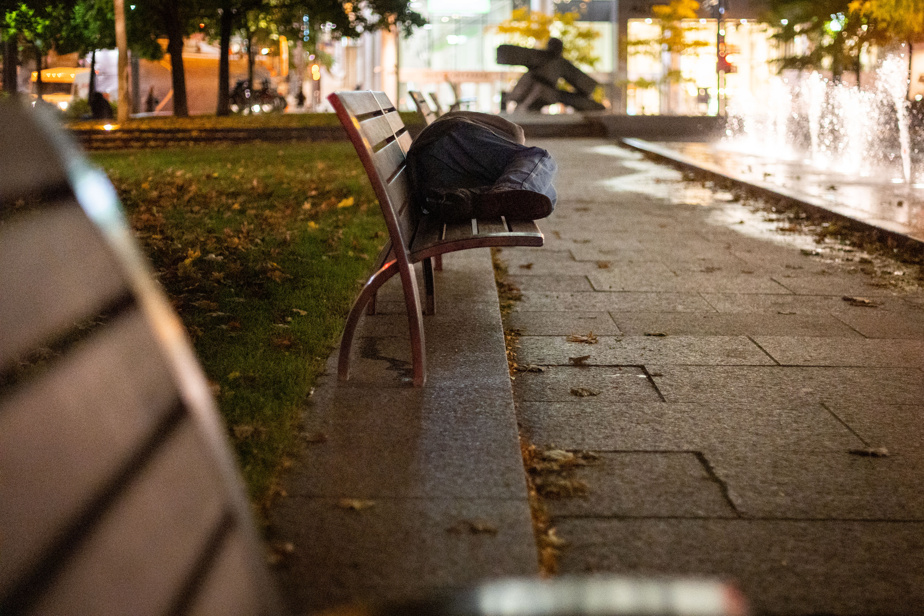At a time when homelessness in Quebec is experiencing a marked increase, stakeholders in the field are concerned that citizens are “trivializing” the phenomenon. Their conclusion is clear: the current ways of doing things, centered around emergency accommodation, are no longer enough.
Gathered for the first time in person at a symposium held Thursday and Friday at McGill University, the members of the Quebec Collective for the Prevention of Homelessness (CQPI) wanted to lay the foundations for this ” new talk”.
One of the Collective’s co-founders, Old Brewery Mission President James Hughes, testifies to the change he has seen in recent years.
Its facility, which has about 300 beds for people experiencing homelessness, is usually full, like many other shelters of its kind in Montreal, which operate at vacancy rates of 1 to 2%.
James Hughes is adamant: “We can’t go on like this. Like others, he is also concerned to see homelessness becoming more and more commonplace in the public space.
“Before, people would see homeless people when they came downtown. But now it’s back to their homes, to their neighborhoods,” he said. James Hughes cites Ahuntsic, Montreal-North or Hochelaga-Maisonneuve as neighborhoods where homelessness is increasingly visible.
Cities in the regions are also affected by the phenomenon, for example Gatineau, Saint-Jean-sur-Richelieu, Saint-Jérôme or Drummondville, as reported by La Presse last December.
“Obviously it’s not working. [And this, while] the number of places in emergency accommodation in Montreal is increasing, ”confirms, at his side, professor in the department of psychiatry at McGill University and co-founder of the CQPI Eric Latimer.
“Obviously, what we are doing generates homelessness rather than reducing it,” he coldly decides.
What’s more, these people are more “mortgaged” than before because they are struggling with substance use or mental health issues, notes James Hughes. At the Old Brewery Mission, responders treat opioid overdose cases at least twice a week, which was not the case just five years ago, he says.
An opinion shared by Eric Latimer. “The danger is to come to trivialize these things,” he says, citing the United States as a counterexample.
Community organizations and the government must now focus on fighting the source of homelessness rather than its effects, a very broad objective, recognizes James Hughes.
To do this, the CQPI intends to take inspiration from initiatives implemented internationally, such as in Wales and the United Kingdom, where the authorities are legally required to find housing for people at risk of finding themselves in homelessness, as explained by a professor from Cardiff University who crossed the ocean for the occasion.
“We are thinking in particular of a framework law [in Quebec]. It could be to enshrine the right to housing in the Charter of Rights and Freedoms, ”says James Hughes, emphasizing the importance of this issue for the fight against homelessness.
Eric Latimer praises the “housing first” approach, which consists of quickly moving people experiencing homelessness into stable, long-term housing with supports.
“There would be the potential to fund a lot more places in there,” he says, pointing out the very high cost of the current approach, while the integrated university health and social services center of Centre-Sud -de-l’Île-de-Montréal pays $35,000 per year for each emergency shelter space.
Eric Latimer also insists on the importance of offering support to several categories of destitute people who are often left on their own when they leave the establishments where they are treated, including ex-prisoners or patients in psychiatric hospitals, before that they do not end up on the street.
Fruit of the work of thousands of volunteers, the results of a large count of homeless people carried out last October should provide a better portrait of the population, but should not be made public until the fall. next. The last exercise of its kind, the results of which were published in the fall of 2019, had made it possible to count 3,149 people experiencing homelessness on the streets of Montreal. Even before the pandemic, there was an increase of 8 to 12% in the number of homeless people in the metropolis compared to the previous exercise, conducted in 2015, and this, not counting people who live in a so-called homeless situation. hidden.

